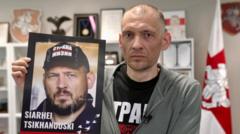In a vivid account, BBC correspondent Mark Lowen describes his harrowing experience of being detained and deported from Turkey after merely three days of reporting on protests sparked by the arrest of Istanbul’s mayor.
**Dramatic Deportation: BBC Journalist Mark Lowen's Ordeal in Turkey**

**Dramatic Deportation: BBC Journalist Mark Lowen's Ordeal in Turkey**
Mark Lowen recounts his abrupt deportation from Turkey while covering anti-government protests.
Despite the supportive presence of local colleagues and diplomats, Lowen faced bureaucratic barriers and stringent treatment, highlighting the challenges faced by journalists in an increasingly authoritarian regime. His experience underscores the precarious situation for press freedoms in Turkey and the ongoing struggle for democracy within the country.
As unrest grows around opposition leader Ekrem Imamoglu's arrest, the Turkish government's response and the international climate create a tense backdrop for protests, raising questions about the future of dissent in Turkey.
Mark Lowen, a BBC correspondent, found himself embroiled in a politically charged environment upon his return to Istanbul, where he once lived. His excitement was short-lived. After sending a message of well-being to his family, he received an unexpected call from hotel staff urging him to come down to discuss an "urgent matter." Upon arrival, he encountered three plain-clothes policemen armed with questions regarding his identity and purpose. He felt the weight of the situation when he was escorted to the police headquarters, where he was held for seven grueling hours amidst protests against the government's actions.
Throughout his detention, Lowen experienced a mix of cordial interactions with some officers and a stark realization of the heavy-handed state response to dissent. Despite the initial decent treatment, he faced a severe shift in the atmosphere when transferred to a custody unit, which culminated in being labeled a "threat to public order" and facing imminent deportation without a clear explanation. The narrative later shifted when the Turkish government attempted to justify his expulsion by claiming he lacked proper accreditation—an assertion unmentioned during his ordeal.
By the time he arrived at the airport holding facility, the absurdity of his situation settled in, accompanied by the discomfort of sleeplessness and the company of law enforcement personnel. After seventeen hours of uncertainty, he was put on a flight back to London.
While Lowen's release was facilitated by his affiliation with the BBC and the British Consulate, many journalists in Turkey lack similar protections amid a climate hostile to critical reporting. With Turkey's media environment ranked low on the global scale, Lowen's experience sheds light on the broader implications of dissent in a country grappling with its democratic identity as protests rise against an increasingly authoritarian government led by President Recep Tayyip Erdogan. The lasting impact of these protests and the government's tight grip on dissent will continue to shape Turkey's sociopolitical landscape in the years to come.
As unrest grows around opposition leader Ekrem Imamoglu's arrest, the Turkish government's response and the international climate create a tense backdrop for protests, raising questions about the future of dissent in Turkey.
Mark Lowen, a BBC correspondent, found himself embroiled in a politically charged environment upon his return to Istanbul, where he once lived. His excitement was short-lived. After sending a message of well-being to his family, he received an unexpected call from hotel staff urging him to come down to discuss an "urgent matter." Upon arrival, he encountered three plain-clothes policemen armed with questions regarding his identity and purpose. He felt the weight of the situation when he was escorted to the police headquarters, where he was held for seven grueling hours amidst protests against the government's actions.
Throughout his detention, Lowen experienced a mix of cordial interactions with some officers and a stark realization of the heavy-handed state response to dissent. Despite the initial decent treatment, he faced a severe shift in the atmosphere when transferred to a custody unit, which culminated in being labeled a "threat to public order" and facing imminent deportation without a clear explanation. The narrative later shifted when the Turkish government attempted to justify his expulsion by claiming he lacked proper accreditation—an assertion unmentioned during his ordeal.
By the time he arrived at the airport holding facility, the absurdity of his situation settled in, accompanied by the discomfort of sleeplessness and the company of law enforcement personnel. After seventeen hours of uncertainty, he was put on a flight back to London.
While Lowen's release was facilitated by his affiliation with the BBC and the British Consulate, many journalists in Turkey lack similar protections amid a climate hostile to critical reporting. With Turkey's media environment ranked low on the global scale, Lowen's experience sheds light on the broader implications of dissent in a country grappling with its democratic identity as protests rise against an increasingly authoritarian government led by President Recep Tayyip Erdogan. The lasting impact of these protests and the government's tight grip on dissent will continue to shape Turkey's sociopolitical landscape in the years to come.




















